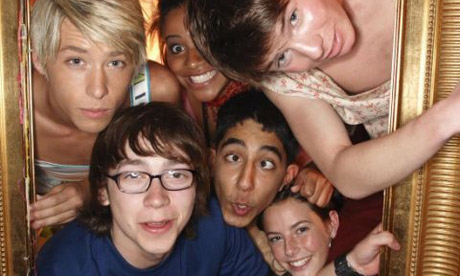
Digital TV channel Dave, E4's teen drama Skins, and Radiohead's managers were among the winners at the first MediaGuardian Awards for Innovation, or Megas, presented last night.
The awards, launched to recognise cutting edge innovation across the media industry, received more than 400 entries from different sectors.
Dave, formerly called UKTV G2, won launch of the year following its repositioning as "the home of witty banter", which has seen the digital TV channel boost ratings despite having much the same programming as before.
The judges praised the rebrand, saying: "Dave did a fantastic job of rebranding an ailing product. The relaunch gave a nondescript channel a strong personality overnight."
Skins won best advertising campaign for the way it used social networking sites alongside more traditional media to build its brand.
The judges said the campaign, by 4Creative, Holler and Naked Communications, was "the first TV series to truly harness the power of online engagement to provide passionate advocacy for a show before it had even had an airing on TV".
"This was an interesting new way of advertising and selling a TV programme," the judges said. "It was a very integrated approach and really seemed to break new ground."
Radiohead's co-managers, Bryce Edge and Chris Hufford from Courtyard Management, were named innovators of the year for the online release of the band's In Rainbow album on an honesty-box basis.
The judges said: "Courtyard were the clear winners. They managed to revolutionise the way music is sold and marketed almost overnight."
PR campaign of the year went to Weber Shandwick's execution of a giant 87,500 square foot KFC logo in the Nevada desert - claimed to be the first brand logo visible from space.
The judges said: "This stunt was a bold idea for a global audience. It enabled the brand to gain worldwide attention without the complication of language."
The National Gallery's decision to put copies of art works around London's streets won the brand identity award. The Grand Tour, undertaken by The Partners, saw 44 exact scale replica paintings hung around the streets of central London for 12 weeks.
It showed a "bold disregard for conventional marketing techniques", according to the judges.
"Removing art from the rarefied atmosphere of a gallery is both foolhardy and brave," they added. "We agreed this campaign was executed professionally, objectors were pacified and the National Gallery saw an immediate upturn in traffic, awareness and PR column inches."
Music promoter Sam Killcoyne was named best rising star for his Underage club for teenagers, which has since expanded into a festival.
Adults are banned from the club but parents are allowed to wait for their offspring in an adjacent creche.
"By creating a brand of live music experiences that cater exclusively for the under-served and underage crowd, and by marketing it through word of mouth and social networking sites, Sam showed a real talent for innovative problem solving," the judges said.
The design innovation award went to Sony PlayStation 3's This is Living website, which allows viewers to get completely immersed in a virtual world to explore and interact with other characters.
The site evolves in real time as viewers interact with it, creating a "uniquely complex, yet intuitively simple" platform. The judges described it as "clever and mysterious - with the feel of a film trailer".
The digital innovation - technology award went to Livestation, which addresses the problem of broadcasting live television and radio over broadband networks to mass audiences.
Developed by Skinkers, Livestation is based on peer network technology exclusively acquired from Microsoft Research to deliver a range of live TV and radio channels to broadband connected computers, spreading the load across the peer network and enabling capacity to rise in line with demand.
The digital innovation - creative award went to VideoJug, which has grown into one of the most successful "how to" sites of its kind, with more than 30,000 films and 4m global unique visits a month.
VideoJug's short, free, professionally produced videos cover every aspect of life, offering helpful advice and expertise on questions such as "can you fold a T-shirt in two seconds?".
The judges described it as "user friendly, with a sharp approach and high production values".
The commercial communication innovation prize went to the Home Office's police community support officers campaign, created by Manning Gottlieb OMD and OMD Fuse, which the judges said gave the programme a "much needed boost" with the creation of an ad-funded television programme following real-life PCSOs on the beat.
The judges added: "Not only are these guys very impressive, ad-funded TV seemed an imaginative way of dealing with quite a difficult problem."
The community engagement award went to Channel 4's Big Art Mob, a cross-platform initiative which aimed to create the first comprehensive map of UK public art.
Created by Moblog:tech, Carbon Media and Edition Design, it allowed users to submit photos online or by mobile phone with each image plotted on an interactive map.
In an online first, the web project started one year before a TV show will follow the creation of six major arts projects in public spaces.
The judges said it "realised the best of a community experience: collaboration, culture, portability and democratisation".
The awards, presented by MediaGuardian in partnership with the BBC and Royal Mail, were presented at the O2 centre in London by TV hosts Hardeep Singh Kohli and Miquita Oliver last night.
An awards supplement featuring the winners will be available with the MediaGuardian section on Monday.
More information and full details of the award judges for each category are available at www.mediatheguardian.com/awards.
· To contact the MediaGuardian newsdesk email editor@mediatheguardian.com or phone 020 7239 9857. For all other inquiries please call the main Guardian switchboard on 020 7278 2332.
· If you are writing a comment for publication, please mark clearly "for publication".

